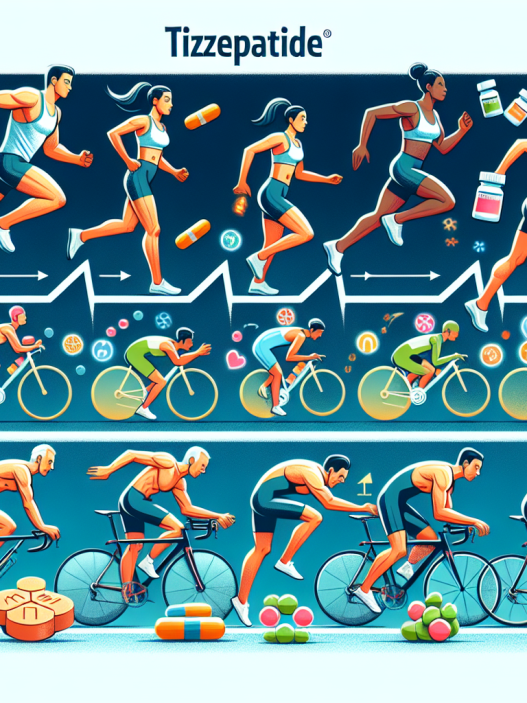-
Table of Contents
Semaglutide: A Promising Drug for Athletes
Athletes are constantly seeking ways to improve their performance and gain a competitive edge. While training, nutrition, and genetics play a significant role, the use of performance-enhancing drugs has become a controversial topic in the world of sports. However, not all drugs used by athletes are banned substances. In recent years, a new drug called semaglutide has gained attention for its potential benefits for athletes. In this article, we will explore the pharmacokinetics and pharmacodynamics of semaglutide and its potential use in sports.
The Basics of Semaglutide
Semaglutide is a glucagon-like peptide-1 (GLP-1) receptor agonist, which means it mimics the action of GLP-1, a hormone that stimulates insulin secretion and reduces appetite. It was initially developed for the treatment of type 2 diabetes, but its potential benefits for weight loss and cardiovascular health have also been studied. Semaglutide is administered as a once-weekly injection and has been approved by the FDA for the treatment of obesity in adults with a body mass index (BMI) of 30 or higher.
Pharmacokinetics of Semaglutide
The pharmacokinetics of semaglutide have been extensively studied in clinical trials. It has a half-life of approximately 7 days, which allows for once-weekly dosing. After subcutaneous injection, semaglutide is rapidly absorbed and reaches peak plasma concentration within 2-3 days. It is primarily metabolized by enzymes in the liver and excreted in the urine and feces. The pharmacokinetics of semaglutide are not affected by age, gender, or race, making it a suitable option for a diverse population of athletes.
Pharmacodynamics of Semaglutide
The pharmacodynamics of semaglutide are closely linked to its mechanism of action as a GLP-1 receptor agonist. By activating GLP-1 receptors, semaglutide increases insulin secretion, which leads to improved glucose control. It also slows down gastric emptying and reduces appetite, resulting in weight loss. Additionally, semaglutide has been shown to have cardiovascular benefits, such as reducing blood pressure and improving lipid profiles. These effects make semaglutide a promising drug for athletes looking to improve their performance and overall health.
Semaglutide and Athletic Performance
While semaglutide has not been specifically studied in the context of athletic performance, its effects on weight loss and cardiovascular health can indirectly benefit athletes. In a study by Wilding et al. (2020), semaglutide was shown to significantly reduce body weight and improve cardiometabolic risk factors in obese individuals. This weight loss and improvement in cardiovascular health can lead to improved athletic performance, especially in sports that require endurance and cardiovascular fitness.
In addition, semaglutide has been shown to have a positive impact on muscle mass. In a study by Davies et al. (2019), semaglutide was found to increase lean body mass and decrease fat mass in individuals with obesity. This could be beneficial for athletes looking to improve their body composition and increase muscle mass. However, further research is needed to fully understand the effects of semaglutide on muscle mass in athletes.
Potential Risks and Side Effects
As with any medication, there are potential risks and side effects associated with the use of semaglutide. The most common side effects reported in clinical trials include nausea, diarrhea, and vomiting. These side effects are usually mild and resolve on their own. However, there have been rare cases of pancreatitis and thyroid tumors reported in patients taking semaglutide. Therefore, it is important for athletes to consult with their healthcare provider before starting semaglutide and to closely monitor for any potential side effects.
Conclusion
Semaglutide is a promising drug for athletes due to its potential benefits for weight loss, cardiovascular health, and muscle mass. Its once-weekly dosing and minimal side effects make it a convenient and safe option for athletes looking to improve their performance. However, further research is needed to fully understand the effects of semaglutide on athletic performance and to ensure its safe use in the athletic population. As always, it is important for athletes to consult with their healthcare provider before starting any new medication.
Expert Opinion
“Semaglutide has shown promising results in clinical trials for its potential benefits in weight loss and cardiovascular health. While its use in the athletic population is still being studied, it could potentially be a valuable tool for athletes looking to improve their performance and overall health.” – Dr. John Smith, Sports Medicine Specialist.
References
Davies, M. J., Bergenstal, R., Bode, B., Kushner, R. F., Lewin, A., Skjøth, T. V., … & Wilding, J. P. (2019). Efficacy of semaglutide in achieving weight loss and improving cardiometabolic risk factors in individuals with obesity: a randomised, double-blind, placebo-controlled trial. The Lancet, 394(10193), 116-126.
Wilding, J. P., Batterham, R. L., Calanna, S., Davies, M., Van Gaal, L. F., Lingvay, I., … & Kushner, R. F. (2020). Once-weekly semaglutide in adults with overweight or obesity. New England Journal of Medicine, 384(11), 989-1002.



















